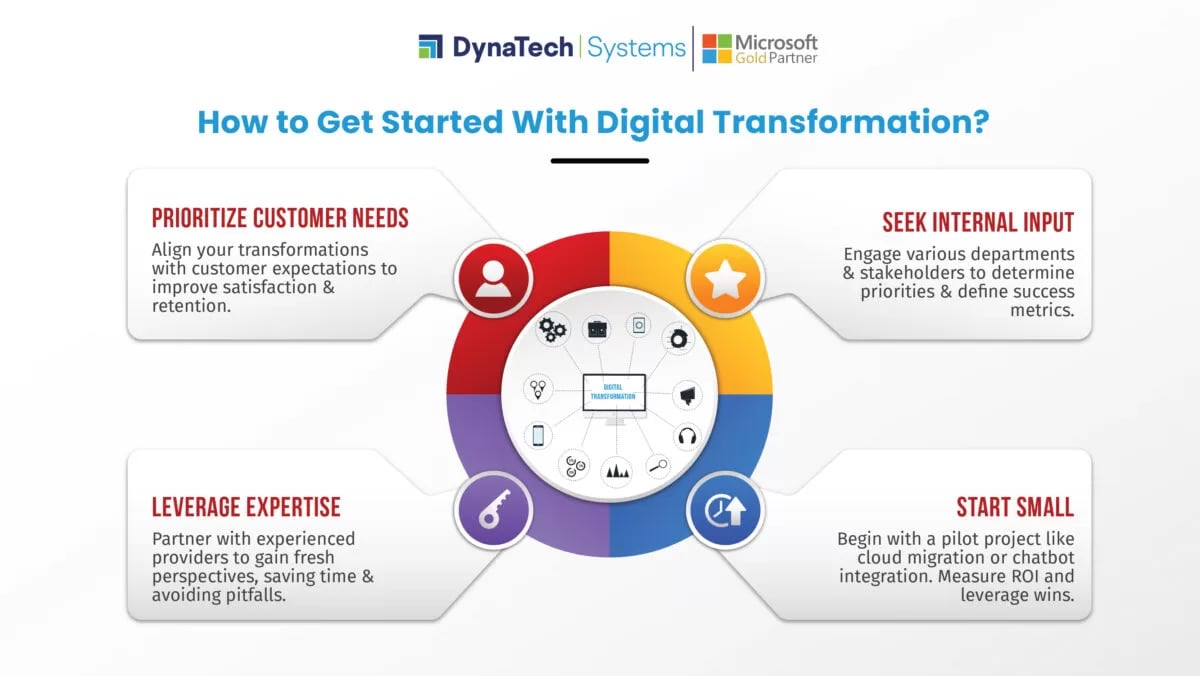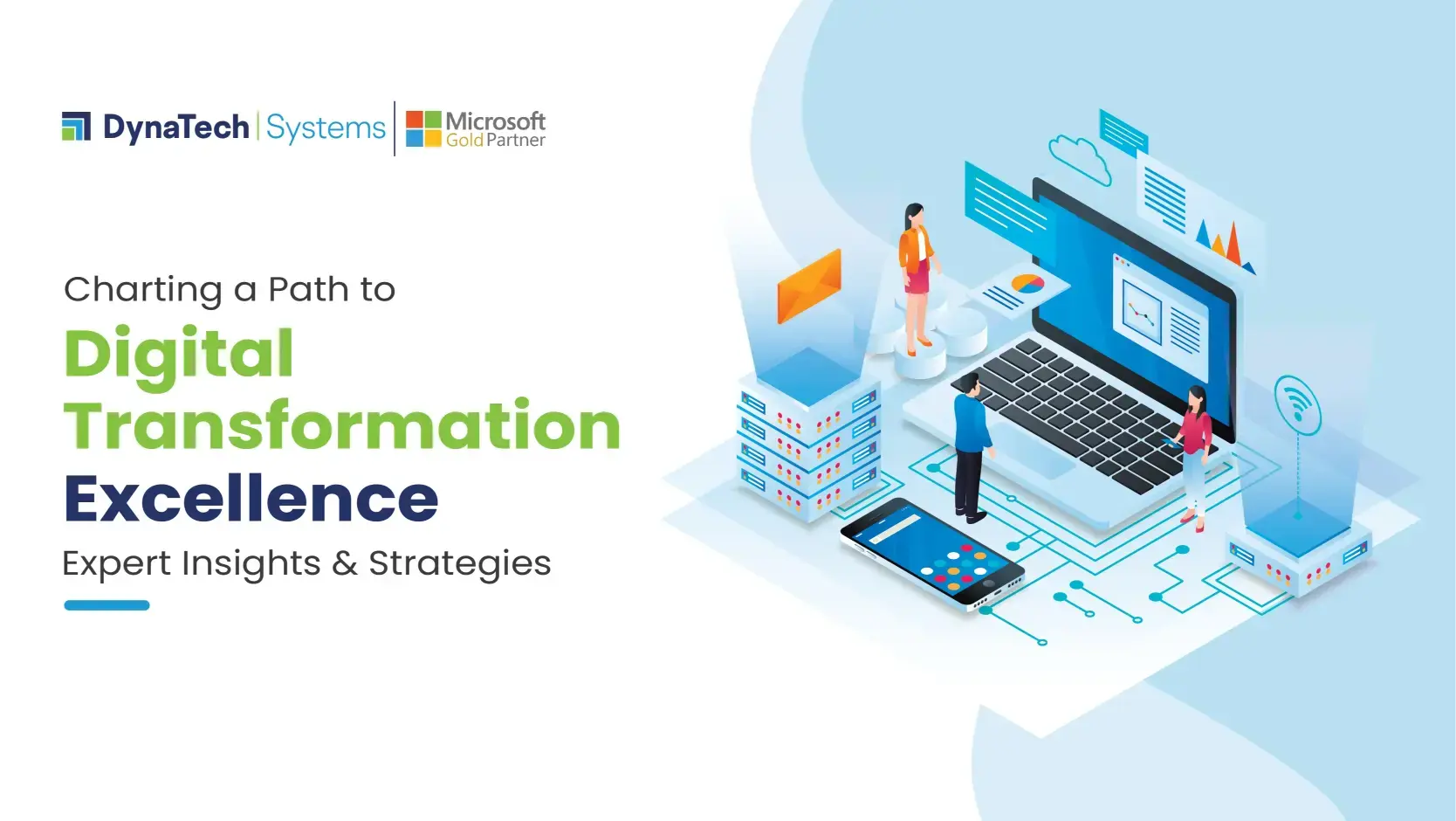Today, digital transformation has emerged as a powerful force driving change across industries and sectors. This paradigm shift goes beyond adopting new tools or upgrading systems; it encompasses a holistic reimagining of business processes, customer experiences, and organizational culture.
Recent times have seen the COVID-19 pandemic inject a fresh sense of urgency into achieving digital transformation objectives. This global crisis has compelled numerous organizations to accelerate their efforts toward transformation.
However, IT leaders continue to grapple with various challenges, including budgetary constraints, talent shortages, and the complexities of instigating cultural change. As we delve deeper, we'll uncover insights from peers and experts specializing in digital transformation, offering guidance and strategies to navigate these multifaceted obstacles.
Digital Transformation and Its Impact
Digital Transformation Definition: Digital transformation involves integrating digital technology across all facets of a business, resulting in profound changes to operations and customer value delivery.
Enhancing technological tools and strategies in this manner supports organizations in enhancing internal operations, augmenting efficiency, and operating with heightened adaptability and flexibility. Consequently, enterprises can promptly and adeptly tackle existing and future challenges.
However, digital transformation extends beyond mere updates to technological systems and procedures. It necessitates a shift in the organizational mindset towards the technologies and workflows employed.
- Digital transformation may involve transitioning employees from on-site work to remote, cloud-based meetings and collaborations.
- It could also encompass transitioning from manual, isolated processes to automated, intelligent systems that harness extensive data collections and operate on cloud technology.
- Additionally, it may encompass embracing novel customer interactions, such as automated chatbots and self-service portals.
Why Is Digital Transformation Important?
Digital transformation is no longer a choice; it's a necessity driven by survival, especially post-pandemic. As consumer behaviors evolve rapidly, businesses must adapt to disruptions in supply chains, changing market dynamics, and customer expectations. Amidst these shifts, the importance of digital transformation and innovation becomes evident.
During the pandemic, consumer behaviors underwent significant changes, with an acceleration of digital adoption across various sectors. While the permanence of these shifts remains to be seen, data suggests lasting changes in areas like streaming, online fitness, home cooking, and cashless transactions. On the B2B front, remote selling has proven effective.
This transformational journey not only enhances internal operations but also unlocks new avenues for customer engagement, propelling enterprises toward sustained growth and competitive advantage in an increasingly digital-driven world.
The Framework of Digital Transformation
A robust digital transformation framework serves as the guiding compass for organizations navigating the intricate terrain of technological evolution. It outlines a structured approach, encompassing strategy formulation, technology integration, process optimization, and cultural adaptation. It includes:
- Operational Agility
- Customer Experience
- Workforce Enablement
- Culture & Leadership
- Digital Technology Integration
Such a framework acts as a blueprint for orchestrating seamless transitions, aligning objectives with digital solutions, and fostering innovation at every level.
Collaborating with a proficient digital transformation agency further enhances the implementation of this framework, providing specialized expertise, insights, and a wealth of experience to propel businesses toward successful transformation.
Benefits of Digital Transformation
- Operational Enhancement
Modern technologies like cloud computing, AI, automation, and machine learning optimize daily operations, accelerating responses to market shifts and customer needs, thereby positively impacting the bottom line. - Accelerated Growth
Streamlining internal processes through digitalization saves valuable time, facilitating faster product/service creation, customer attraction, and revenue-focused initiatives bolstered by strategic data utilization. - Flexible Work Landscape
Employing digital tools enables secure and efficient remote work, meeting the evolving preferences of employees, thereby aiding in talent attraction and retention. - Cost Optimization
Digital transformation benefits into transitioning from analog to automated, cloud-based workflows reduce costs associated with data storage and scaling IT resources, supplemented by pay-as-you-go pricing models. - Unified Communication
Centralizing internal communication on cloud platforms enhances real-time collaboration, productivity, and coordination through diverse tools and features. - Employee Empowerment
Intelligent tools aid employees in accomplishing tasks more efficiently, increasing job satisfaction and overall retention.
- Enhanced Customer Engagement
Adjusted interaction modes and superior customer service experiences contribute to engagement, incorporating diverse channels like email, chatbots, and self-service resources. - Strengthened Security
Automation of security processes, coupled with cloud providers' advanced threat detection and compliance features, reinforces data protection and regulatory adherence. - Improved Resiliency and Agility
Cloud computing ensures business continuity, automates disaster recovery, and fosters agility, enabling proactive responses and strategic planning. - Sustainable Drive
Embracing cloud solutions and remote work reduces environmental impact, curbing reliance on physical equipment, electricity consumption, and commuting, thereby promoting sustainability.

The Key Trends of Digital Transformation In 2024
In 2024, various key trends are shaping the landscape of digital transformation, impacting industries such as financial services and garnering the attention of digital transformation companies.
- AI-Powered Insights and Automation
In 2024, we can expect a surge in the use of AI for data analysis, decision-making, and automation. AI-powered insights will empower organizations to make data-driven decisions, enhance customer experiences, and optimize operational efficiency. - Extended Reality (XR) Integration
Extended Reality, encompassing Virtual Reality (VR), Augmented Reality (AR), and Mixed Reality (MR), is set to become a cornerstone of digital transformation in 2024. Organizations will leverage XR to enhance customer engagement, employee training, and collaboration. From immersive virtual experiences to augmented data visualization, XR technologies will break down geographical barriers and create new possibilities for communication and interaction. - Cloud Native Technologies
Cloud Native Technologies will continue to revolutionize IT landscapes, with microservices architecture providing scalable and agile solutions. DevOps practices, emphasizing collaboration between development and operations, will further accelerate software delivery, ensuring faster time-to-market and enhanced adaptability to dynamic business needs. - 5G Revolutionizing Connectivity
With faster and more reliable connectivity, businesses can expect improved app performance, enhanced IoT capabilities, and seamless communication. The low latency of 5G will enable real-time data processing, in fields such as healthcare, manufacturing, and autonomous vehicles. - Robotic Process Automation
Organizations will harness RPA to streamline business processes, reduce errors, and increase productivity, allowing human resources to focus on more complex and strategic endeavors. This automation wave will not only enhance operational efficiency but also drive cost savings and improve overall business performance. - Cybersecurity Resilience
Organizations prioritize cybersecurity resilience, adopting proactive approaches to safeguard sensitive data and systems. With the integration of AI in cybersecurity, threat detection, and response have become more sophisticated, ensuring a proactive defense against evolving cyber threats. - Hyper-Personalization
In 2024, hyper-personalization emerges as a digital transformation trend, reshaping customer experiences across industries. Leveraging advanced analytics, artificial intelligence, and big data, businesses will tailor products, services, and marketing strategies to individual preferences. - Blockchain and DeFi Integration
Financial institutions are increasingly adopting blockchain and decentralized finance technologies to streamline operations, improve transparency, and unlock new opportunities. - Data Monetization
Companies are no longer just collecting data; they're leveraging it as a revenue-generating resource. Through innovative analytics, businesses can extract actionable insights, create new products or services, and even sell anonymized datasets. - Digital Identity Solutions
With rising concerns around privacy and cybersecurity, organizations invest heavily in advanced digital identity technologies. Biometrics, blockchain, and decentralized identity systems play a crucial role in providing individuals with a secure and seamless way to authenticate themselves across various digital platforms. - RegTech Advancements
With ever-evolving regulatory requirements, organizations turn to advanced RegTech solutions. Artificial intelligence, machine learning, and automation streamline compliance processes, ensuring adherence to regulations while reducing operational risks.
How to Measure ROI For Digital Transformation?
- Define Clear Objectives
Begin by establishing specific, measurable goals for your digital transformation efforts. Whether it's improving operational efficiency, enhancing customer experience, or increasing revenue, having well-defined objectives is crucial.
- Baseline Metrics
Before implementing any changes, capture baseline metrics to serve as a point of comparison. This might include metrics like current revenue, customer satisfaction scores, operational costs, or employee productivity. - Financial Metrics
Quantify the financial impact of digital transformation. Calculate changes in revenue, cost savings, and profitability attributed to the initiatives. For instance, compare pre-transformation and post-transformation revenue figures. - Employee Productivity
Measure changes in employee efficiency and satisfaction. Track metrics like employee engagement, productivity levels, and time saved through digitized processes. - Data-Driven Insights
Analyze how data-driven insights have influenced decision-making and strategy formulation. Consider the effectiveness of data analytics in identifying trends, customer preferences, and market opportunities. - Cost-Benefit Analysis
Compare the total cost of digital transformation implementation against the benefits gained. Include expenses such as technology investments, training, and operational adjustments.
Measuring ROI on digital transformation requires a comprehensive approach encompassing financial, operational, customer-centric, and qualitative aspects. Regularly analyzing these metrics and adjusting strategies ensure that your digital transformation efforts contribute to sustainable growth and success.
Digital Transformation – Use Cases
- Embracing Real-Time Communication
Cloud-based communication tools, offering features like real-time chat, video calls, and file sharing, are pivotal for efficient remote and hybrid work arrangements, enabling seamless collaboration from diverse locations. - Fostering Innovation in Dispersed Teams
Digital collaboration tools have enabled businesses, especially in response to the pandemic, to expedite product development and adapt to changing consumer needs, exemplified by clothing brands releasing more home-oriented products. - Elevating Customer Experience
Businesses leverage digital platforms to cater to modern consumer habits, including mobile shopping, online reviews, and social media engagement. This approach enhances customer support and recommendations, boosting brand loyalty. - Embracing Cloud Data Storage
Organizations benefit from digital data storage solutions by improving efficiency, accuracy, and space utilization. Cloud-based patient recordkeeping in healthcare, for instance, streamlines processes and enhances patient interaction. - Leveraging Intelligent Insights
Transitioning from siloed data storage to unified, intelligent solutions with AI and big data capabilities empowers businesses with faster reporting, trend identification, and accurate forecasting, facilitating well-informed decisions.
How to Get Started with Digital Transformation?

Embarking on a successful digital transformation journey begins with a strategic and well-structured approach.
- Firstly, assess your organization's current state and future goals to identify areas ripe for digital innovation.
- Collaborating with experienced digital transformation consulting firms can provide invaluable insights, helping you define a roadmap that aligns with your objectives. These firms specialize in evaluating your existing processes, technologies, and culture, offering a comprehensive plan for integrating digital solutions seamlessly.
- Moreover, assembling a cross-functional team involving stakeholders from different departments ensures diverse perspectives, fostering a comprehensive strategy that considers all facets of your business.
- Once your roadmap is established, prioritize initiatives that will deliver significant impact. Begin with pilot projects that can show early success and indicate the value of digital transformation. This not only generates momentum within the organization but also garners buy-in from key decision-makers.
- Continuously monitor and measure the outcomes of these initiatives, adapting your approach based on real-time data and feedback.
Digital transformation is an ongoing journey, and with the guidance of a reliable digital transformation consulting firm, you can navigate this evolution successfully, embracing innovation and positioning your organization for long-term success.
Get Started with the Right Digital Transformation Consultant
Ready to begin your digital transformation journey and unlock the full potential of your organization? Partner with a reliable digital transformation consultant who can help you navigate this exciting evolution. Contact us today to explore tailored strategies, expert guidance, and a roadmap to innovation that will reshape your business for the digital era. Let's collaborate and drive your company's transformational success.




























